Are Italy serious contenders for Euro 2020, or flat-track bullies?
FFT were at Wembley to see the Azzurri beat Austria and set a new national record - but now can they mix it with the big boys?
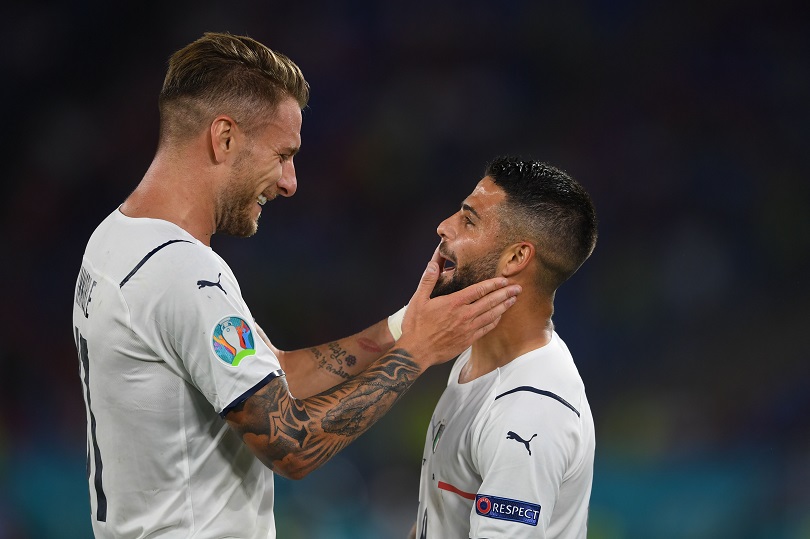
Thirty-one matches, zero defeats. Italy set a new national record at Wembley last night - and not for the first time, they did it by narrowly avoiding losing to Austria.
Back in 1937, the Azzurri were just over a year into a 30-game unbeaten run when they headed to Vienna for a fixture in the Central European International Cup.
After 74 minutes, they were trailing when crowd trouble caused the match to be abandoned, amid the turbulent political atmosphere of Europe before World War Two. Having escaped defeat, Italy went unbeaten for two more years, and won the 1938 World Cup in the process.
Last night, thankfully it was VAR - not the prelude to war - that helped them avoid embarrassment against Austria. They briefly looked destined for a shock exit in the last 16 of Euro 2020, only for Marko Arnautovic's goal to be ruled offside by mere centimetres.
Now, they hope to capitalise in the same way as they did in 1938, by going on to win Euro 2020. Second favourites with the bookmakers right now, as they were going into the round of 16, it's hard to argue with their statistics. Yet one nagging doubt remains. Have they truly proven they're good enough to go all the way?
MATCH REPORT Italy 2-1 Austria: Tie bursts into life in extra time as Azzurri make quarter-finals
AZZURRI Italy Euro 2020 squad profile: Best player, manager and past Euros record
Get FourFourTwo Newsletter
The best features, fun and footballing quizzes, straight to your inbox every week.
The team no-one can beat
Some will suggest that a 31-match unbeaten run has proved it beyond question, but it's worth assessing the opposition they've faced since their last defeat, away to Portugal in the Nations League in September 2018.
They drew the return match against the same opposition, then went into a Euro 2020 qualifying group with Finland, Bosnia, Greece, Armenia and Liechtenstein. Perhaps unsurprisingly, given the strength of the group, they won every game.
Since then, their most impressive scalp was a 1-0 win in the Netherlands, but other than the Dutch, they haven't really faced anyone of real note.
They sailed through Group A at the Euros with highly encouraging victories over Turkey, Switzerland and Wales in Rome, but even those results can't be used as an entirely accurate gauge of their chances of lifting the trophy - particularly given that Wales, second in that group, then lost 4-0 to Denmark in the last 16.
The Azzurri's home advantage ended in the group stage - their second-round tie against Austria was the first chance to see how they'd cope without it. At first, it seemed like business as usual, as they attacked menacingly in the opening stages of the game.
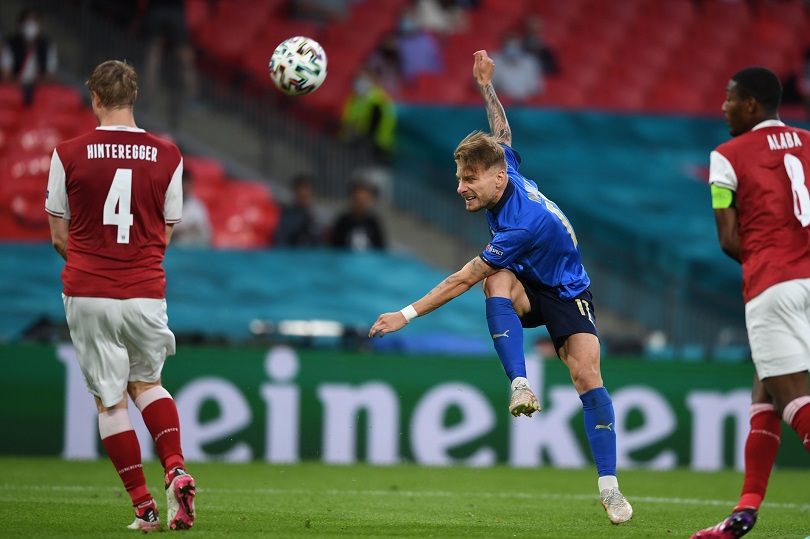
As it turned out, they were pretty much exactly following the template set by England in every one of the Three Lions' Euro 2020 matches at Wembley - hit the post early on at 0-0, look bright in the first half, then fade after the interval.
Italy actually looked a far more threatening proposition on the counter attack - their best spell came in the first 20 minutes when they had only 42 per cent possession, but used it dynamically, particularly on the left where Leonardo Spinazzola, Marco Verratti and Lorenzo Insigne combined to good effect.
When they started to gain more possession, they also began to find it more difficult to break down Austria. For much of the second half, they looked vulnerable defensively for the first time in the tournament.
Looking at the defence that started against Austria, perhaps it wasn't entirely surprising that they had some difficulties. Italy didn't concede a goal in the group stage, but the experienced Leonardo Bonucci was joined in the back four at Wembley by Giovanni Di Lorenzo, Francesco Acerbi and Spinazzola.
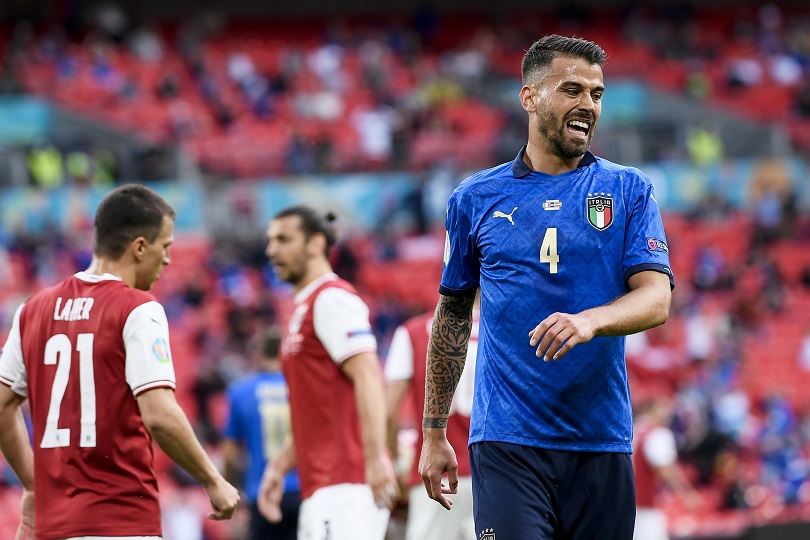
Di Lorenzo is 27, but this was only his 10th cap, and the Napoli right back has never progressed further than the last 16 of the Champions League.
Acerbi is 33 - only one year younger than Bonucci - but this was just his 17th cap, and the Lazio man has never gone beyond the group stage of the Champions League.
Spinazzola is 28, but this was also his 17th cap, and the Roma left back has played only one match in the Champions League, for Juventus in 2019.
In the case of Di Lorenzo and Acerbi, both were only playing because of injuries to the more experienced Alessandro Florenzi and Giorgio Chiellini, who could be back for the quarter final against Belgium or Portugal.
The returning duo are proven on the European stage - Florenzi was part of Roma and PSG sides that made the Champions League semis, while Chiellini has reached two finals and also featured in the final of Euro 2012 alongside Bonucci. Their return could help to rectify some of the issues the Azzurri faced against Austria.
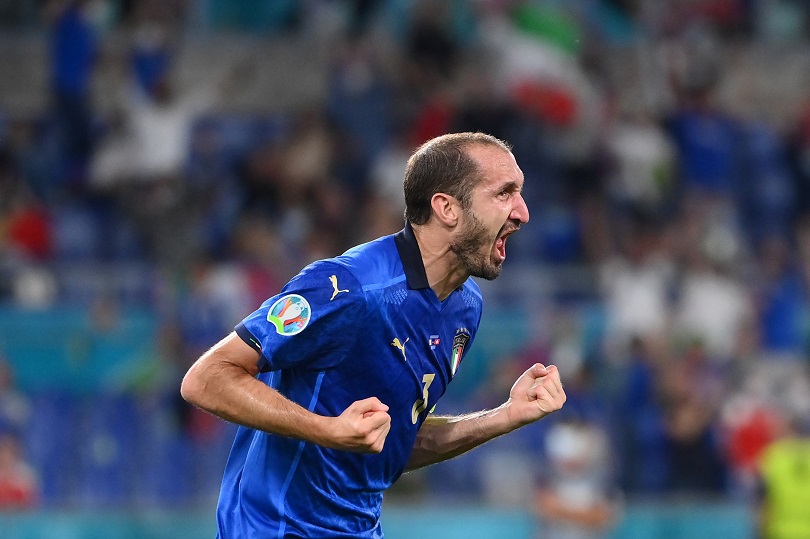
In attack though, there are similar question marks. Starting trio Insigne, Ciro Immobile and Domenico Berardi all impressed during the group stage, and had a number of bright moments against Austria before Italy's attack faded. But can they do in the biggest matches now, against the best sides in Europe?
The answer to that is we simply don't know. Insigne is 30, has nine international goals and has never made it beyond the last 16 of the Champions League with Napoli. Berardi is 26, has five goals for the Azzurri and has only ever played in the Europa League with Sassuolo.
Immobile is perhaps the most interesting case - a year ago he equalled the record for the most goals ever scored in a Serie A season, netting a hugely impressive 36 times in 37 matches for Lazio.
As well as representing the Biancocelesti in the Champions League, he's also played for Borussia Dortmund and Sevilla in the competition, yet has never progressed further than the last 16. He's 31, and has only scored 15 goals for Italy.
In a similar way to Leicester's Jamie Vardy, Immobile has been a consistent scorer at domestic level for years, without ever making a truly spectacular mark in European or international competition.

Federico Chiesa is also pushing for a start after his fine goal put Italy on the road to extra-time victory over the Austrians, although he too has never gone further than the last 16 of the Champions League - albeit he's younger, at 23.
That Italy's attacking stars have performed so well in recent times is credit to Roberto Mancini, who is doing what a good coach does - getting more out of players than they've produced previously.
But contrast Italy's options with some of the other teams tipped as favourites to win Euro 2020, and the Azzurri remain the most unknown quantity.
France have four-time Champions League winner Karim Benzema alongside world champions Kylian Mbappe and Antoine Griezmann.
Belgium have Kevin De Bruyne supplying Romelu Lukaku and possibly Eden Hazard, all of whom have progressed far in the Champions League and also featured in a World Cup semi final.
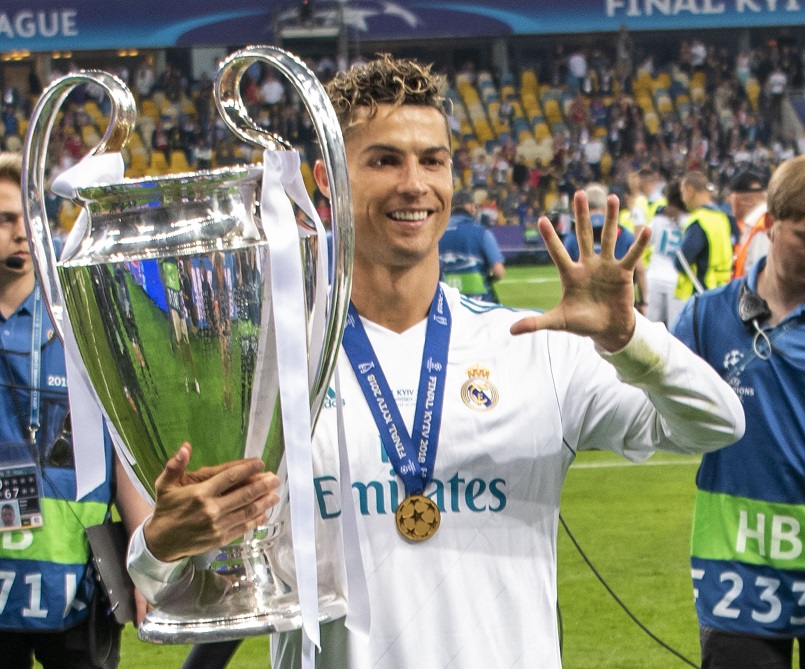
Germany have Thomas Muller, Serge Gnabry, Kai Havertz and Timo Werner - each Champions League winners within the last two years.
England have Harry Kane, Raheem Sterling, Mason Mount and Phil Foden, who have all appeared in the final - and in Mount's case, won it.
Portugal have some chap called Cristiano Ronaldo.
Having those names doesn't automatically lead to success - past performance is no guarantee of future results. But they are players who have proven they're good enough at the very highest level. Italy's forwards currently have not.
Now is their opportunity to prove it. Defeat Belgium or Portugal in the quarter finals, and they will go a long way towards that.
If the Azzurri can continue their unbeaten run all the way to the Euro 2020 final, they have the chance to go down as one of the greatest Italian teams in history. Fall short in the last eight, and they risk being remembered as flat-track bullies.
Subscribe to FourFourTwo today and get a FREE England Euro 96 shirt!
READ NEXT
FOR YOUR HOME Euro 2020 wall chart: Download free with full schedule, fixtures and dates
REFS Euro 2020 referees revealed: who are they, how were they selected and will VAR be in use?

Chris joined FourFourTwo in 2015 and has reported from 20 countries, in places as varied as Jerusalem and the Arctic Circle. He's interviewed Pele, Zlatan and Santa Claus (it's a long story), as well as covering the World Cup, Euro 2020 and the Clasico. He previously spent 10 years as a newspaper journalist, and completed the 92 in 2017.
